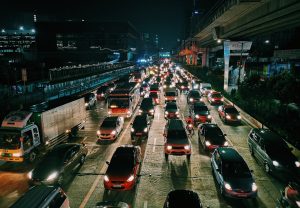 Noise pollution is an ever-increasing environmental hazard and is also a threat to public health. Let’s look at some practical steps to take to turn this trend around.
Noise pollution is an ever-increasing environmental hazard and is also a threat to public health. Let’s look at some practical steps to take to turn this trend around.
Modern civilisation has gotten very noisy. Noise pollution has a very damaging affect the life habits and ecosystems of the natural world. Ecosystems can change drastically as they are impacted by noise pollution causing natural predators, seed disperses and pollinators to take their vital business elsewhere. This is changing the face of the landscape right before our eyes.
Furthermore, noise pollution can be just as bad for human health. According to a post in the New Yorker, noise pollution can cause humans to lose their hearing and develop heart conditions, hypertension, low-birth rates and massive populations of insomniacs.
The takeaway? We are quite literally drowning ourselves in a pool of our own noise.
Even still, while we hear plenty of talk on the importance of reducing the carbon footprint left by human activity, not too many people make mention of the need to minimise the noise footprint. This might be because many of the biggest noise-makers play a vital and pervasive role in economy and society. Those like the logging, manufacturing and haulage industries are the most obstreperous of the lot.
But, there is still plenty the environmentally conscious individual can do to lower their personal noise footprint, for example working with an acoustic consultant who understands BREEAM Hea 05.
Here are several ideas on how to minimise your noise footprint:
Expand your awareness of noise pollution
In his book “The Unwanted Sound of Everything We Want”, Garret Keizer suggests people become more aware of the noise in their local areas by sitting with their eyes closed and tuning into the sounds of their environment. Begin with macro noises like the sirens and passing ambulances, then focus on the micro noises like the whirring of the washing machine or the fridge. If you live in an urban area, you may produce a very long list.
But, even those living far away from the urban hustle will be affected by considerable noise pollution and macro noises like air traffic and industrial activities. The explorer Erling Kagge, wrote in his book “Silence: In the Age of Noise” that silence I indeed vanishing from the earth and is in danger of going extinct altogether.
Swap out loud outdoor activities for something quieter
As you become more in tune to the noise levels around you, you may begin to develop a desire to begin cutting back on your loudest activities. Some of the noisiest include driving sports cars and motorcycles with especially loud exhausts. Other vehicles like motorboats, snowmobiles and ATVs can also have an especially bad effect of the local wildlife.
One of the best ways to move about would be on a bicycle which emits no carbon and makes almost no noise at all. Of course, some people will not be able to commute to and from work or collect their children and daily necessities on a bike. Still, you can make sure your car is functioning properly and not blare your car stereo while on the roads and highways.
Lower the volume of garden work
Tools applied to keeping the garden and lawn clean and well-manicured can also contribute to the noise pollution in your area. Here the small animals that often visit gardens can suffer from the excess clamour.
Whenever possible, try to apply manual tools and equipment to garden work. Using an electric or manual lawn mower is a great improvement over the gas-powered option. Another idea would be to quit mowing all together and allow your garden to become an inviting meadow where flora and fauna can thrive.
Be mindful of domestic noise
In his book “The Soundscape: Our Sonic Environment and the Tuning of the World”, R Murray Schafer, states that the most common type of noise complaints are made about music, dog barking, fireworks, and raucous parties. During the night this leads to conditions of mental wellness that can be caused by lack of sleep, according to the World Health Organization.
The solution? Pipe down!
Finally, not all noise has to be as disruptive as the clamour of excited shrieking teenagers to still be damaging. Consider the conditions of your domestic appliances, the consistent droning of your air conditioning, washing machines or other apparatus can also be contributing to the noise in your environment. Swapping out or repairing your appliances can be the best solution to reducing the noise levels.
